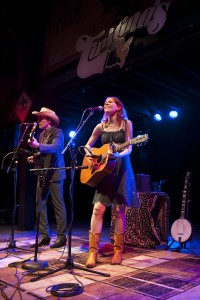Last night’s Gillian Welch show at Tipitina’s left me wondering if I’d ever bother with an acoustic show in a club again. She was charmingly self-deprecating without having it seem like shtick or a revelation of something deeper, and Dave Rawlings’ harmonies and just-busy-enough lead lines made the show engrossing at a musical level beyond the lyrics. But the evening was marred by the constant tension between people talking and people shushing, a tension that Welch and Rawlings fueled by calling for more quiet from the stage.
That conflict seems inescapable. I’ve also seen it at Richard Thompson and Alejandro Escovedo shows, and they, like Welch and Rawlings, are strong performers whose audiences likely knew they were going to acoustic shows. The level of chatter wasn’t a reflection on any of them as performers or the inconsiderate nature of their fans; I take it as a basic fact that clubs are social venues and watching a concert is a social act. Talking is going to happen. Last night when I walked into Tip’s, I ran into two friends I hadn’t seen in a while, one of whom wanted to ask me about a new album. I said hi and answered as quickly and quietly as I could, then moved on because I knew if I stayed with them, we’d keep talking – not catching up on wives, jobs, etc., but we’d make observations about the show.
But there’s no getting around how distracting the collective chatter can be, almost as distracting as the retaliatory, moralistic “SSSSSSHHH!” But besides the dueling non-musical noises, the problem with this dynamic is that it wrecks the sense that a concert is a gathering of the tribe. A show is collective occasion where the fans of a band or a type of music come together because they share something, and at a time when so many things divide people, moments that unite them seem more valuable than ever. The battle over noise keeps that from happening at acoustic shows, and it can foster our most divisive instincts – the ones that make us feel superior and persecuted at the same time.
The question is what can be done about this. I wondered last night on Twitter and Facebook if sound men could simply turn up the PA for acoustic acts. I expect the amount of conversation is the same at electric shows as it is at acoustic shows, but we don’t hear it because the bands are simply louder. A sound man said that would create feedback problems. Is that true? A few people recommended something like Baton Rouge’s Red Dragon Listening Room – an intimate, sit-down room for acoustic artists – but I wonder if the economics of such a space would make shows like Welch, Thompson or Escovedo’s possible. And, more than that, it seems somehow at odds with the democratic spirit of a concert – a place where people from very different walks of life are brought together by at least one shared interest (I recognize that this point is more of a feeling and one I haven’t fully worked out yet).
Last night, I left a show I enjoyed feeling melancholy not because of the dour lyrical world Welch inhabits – she joked that in Nashville, she and Rawlings were known as the people with “dead baby songs” – but because it seemed like trying to see acts like hers was a doomed enterprise. That doesn’t mean they’ll stop happening, but I suspect they’ll remain frustrating events until someone applies some creative thinking to the problem.





